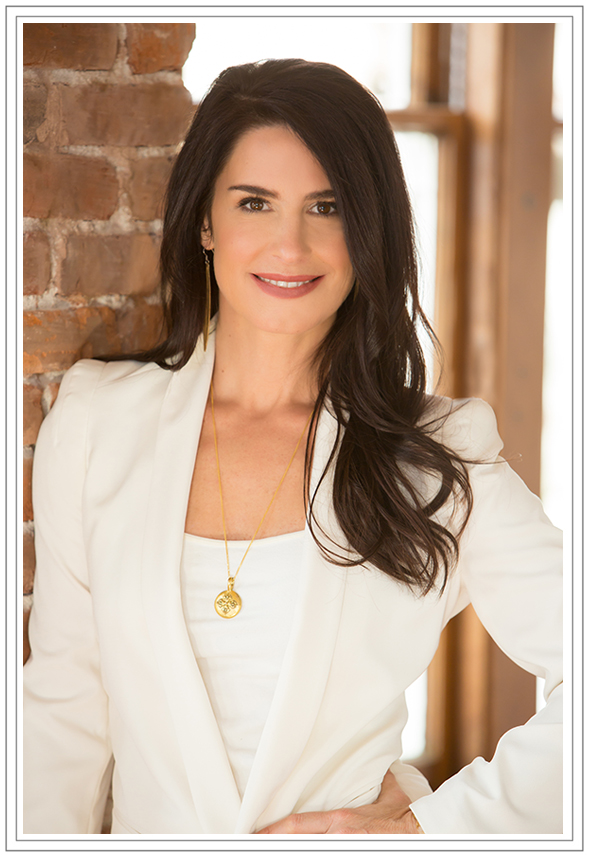
Hey there, friend—
While at my gym on the treadmill this past weekend, a woman was inquiring about what I do and, after sharing a bit, she asked me a question I wasn’t expecting.
“How can I let go of past regrets and be okay with the life I have?”
This one caught me somewhat off guard—and I saw it as an opportunity to offer up some of my own insights.
First of all, this question is a first step toward what I consider to be a beautiful, albeit sometimes difficult journey of self-discovery and healing.
I always say that awareness is the first cornerstone of healing and growth. In this case, a person needs to have the awareness that regret is something they’re up against.
If you find yourself frequently ruminating over “what could have been” or feeling marred by past decisions and outcomes, you’re likely holding onto regrets.
Now that you have awareness, let’s consider what it might look, sound or feel like to shift your experience of how you’re walking with this prickly emotion.
What It Means to Let Go of Regrets and Embrace What’s Here Now
Letting go of past regrets involves releasing the emotional hold that past mistakes, missed opportunities, or unresolved conflicts have on you.
In some cases, that means using specific “release techniques” and, more often, it’s about getting the learnings and understanding there’s another way to be with the past.
A way that supports you in acknowledging these experiences, understanding their impact, and consciously deciding to not let them dictate your current and future happiness.
Embracing the present moment is a means for being with what is—fully engaging with your current experiences, circumstances, feelings, and surroundings with a level of gratitude for what is, versus focusing on what could have been or what “isn’t”.
Easier said than done, I realize.
It’s been my experience that these shifts don’t happen overnight. They will require some time and distance between the original event and the current desired outcome, which is to be free of the pain.
Why Letting Go of Past Regret is Important
Holding onto past regrets can have a profound impact on your mental, emotional and physical well-being. It can lead to chronic stress (✔️check), anxiety (✔️check), and even depression (✔️check).
While these may seem like stale stats, they are legitimate issues that can become debilitating over time (speaking from personal experience).
Regret keeps you anchored in a place of pain from the past and prevents you from moving forward in healthy, integrated, and informed ways.
By choosing to let go, you allow yourself the freedom to heal, to grow, and learn from your experiences without feeling like you made a mess of things.
Focusing on what’s right here, right now, carries the potential for your increased happiness, strengthened relationships, and a greater sense of inner peace and fulfillment.
In theory, it’s quite simple. And yet, when walking through the crazy twists and turns of life, this practice is anything but easy.
I shared a few of these practices with Jessica last weekend, and wanted to share them with you, as well, because regret can be a really tough one.
Some Practices for Letting Go of Regrets
1. Acknowledge and Accept Your Feelings: The first step in letting go is to acknowledge your regrets and understand why they affect you. I call this “being with what is”. Journaling can be a powerful tool to explore these feelings. Write down your regrets, the emotions that come up, and any underlying fears or beliefs associated with them.
This was a daily practice for me when I went through a 5-year grief process while healing from divorce.
2. Practice Self-Compassion: Be kind to yourself. Understand that everyone makes mistakes and that your mistakes do not define your worth. In fact, they are your greatest teachers. Speak to yourself as you would to a dear friend.
I would often self-soothe by repeating to myself, “You’re okay, Tris. Everything is okay. You’re going to be okay.”
3. Reframe Your Past Experiences: Shift your perspective on past events. Instead of viewing them as failures, see them as lessons that have shaped who you are today—and who you are becoming. A solid reframe can transform negative emotions into a source of strength and growth.
Ask yourself, “What’s another way I can look at this situation—one that, while it may not be the way I wanted things to turn out, will help me view it differently?”
4. Get Clear on Your Intentions Moving Forward: Get the lesson from what happened in the past, implement the feedback, and focus on what you want to experience moving forward. Use the past as a point of reference and decide how you will utilize what you learned from it. Consciously choose to create what you want for yourself, in your work, and your relationships.
This is where my mantra has become “Who am I choosing to become, despite how things have unfolded? Who do I want to be in this moment, and moving forward?”
5. Align with Your Values: Your values tell you who you are and what’s most important to you. Chances are, you weren’t aligned with your values when you made certain choices in the past, and therefore your needs went unmet. The person or situation is no longer available for reconciliation, so your work now is to align your thoughts, behaviors and decisions with your core values, so that you’re living fully into what’s good for you—even as you’re working through life’s hard parts.
I will say that regret can be one of the harder emotions to release because there can be so much guilt associated with it.
That said, this is just one reason why emotional healing and personal growth work are so relevant for overcoming our internal conflicts and struggles with the past.
Every regret, no matter how significant, can be approached with compassion and understanding—providing you’re able (and willing) to get yourself into the right mindset.
It’s about making a conscious choice to not let these regrets define you and, instead, working with various self-regulation practices to create more harmony on the inside.
Seeking professional guidance, like a coach or therapist, can also provide the support you need to navigate through deeper issues.
I’ve found that practicing self-regulation techniques can help train your mind to focus on the present moment.
Techniques like deep breathing, reframing, or even having hobbies (mine are hip-hop dance class, horseback trail riding, and flying airplanes) can also help anchor you in gratitude for what’s here now.
I hope this helps you in some small (or massive) way. We’re all human and we all have our regrets.
The thing is, we don’t have to live in a perpetual state of suffering with them.
What it really boils down to is understanding that you were doing the best you knew how at the time, and with the resources you had.
Chalk it up to life teaching you a lesson—really get the lesson—and do things differently next time.
Remember, you are not alone on this journey. With 25+ years of experience guiding women within—through the inner work, I am here to support you every step of the way.
I offer online programs, a membership portal (doors will re-open mid-August to join), deep immersions, in-person women’s retreats, and 1-1 opportunities for you work with me directly to heal the past, reprogram your patterns, and move forward into your full feminine agency.
I’m just an email away!
Until next time, sending lots of love.


An International Bestselling Author, Lifestyle and Leadership Coach and speaker, Tris Thorp is one of today’s leading experts in the field of personal growth and leadership development, specializing in emotional healing, women’s empowerment and shadow work.
Having spent a decade traveling the world, being trained by and sharing the stage with Dr. Deepak Chopra in the field of social emotional learning, consciousness and mindfulness-based practices, Tris has a real gift for integrating the ancient spiritual teachings with modern-day science and mindfulness to help people all over the world let go of their past and create an empowered new future.
During her tenure at the Chopra Center, Tris apprenticed under the Chopra Center’s co-founder Dr. David Simon, co-facilitating the Healing the Heart and Emotional Freedom workshops alongside him. Prior to his passing in 2012, Dr. Simon appointed Tris as the person to carry on his teachings in the field of emotional healing. In addition, Tris was fortunate to be mentored by the late Debbie Ford prior to her passing in 2013, which is where she continued her extensive studies of the unconscious mind and concepts of the persona and shadow. After the loss of her two mentors, Tris went on to become certified through the Ford Institute as a coach specializing in Shadow Work and reconciling mental and emotional issues stemming from past experiences. She continues to share the gifts of emotional healing and facilitating this work in the footsteps of her former mentors.
Tris is the International bestselling author of Healing Your Heart: Rewrite Your Story with Awareness and Intention. A guide book to understanding your emotions, how we create our story and workable tools and techniques to heal from the past, Healing Your Heart stewards you through the process of releasing mental and emotional baggage, forgiving yourself and others, setting and enforcing boundaries and consciously communicating your needs in a loving and effective way so you can be who you’re meant to be, do the things you want to do and have all that you deserve to have in this life.
Tris is also the co-author of bestseller Mental and Emotional Release® with Dr. Matt James. Written in a language both professionals and non-professionals can understand, Mental and Emotional Release® offers real life case studies, an overview of MER and its foundation, step by step scripts to follow, and clinical efficacy studies comparing MER to other therapies.
Clearly in her dharma, Tris’s passion and dedication to gently guide people on their inward journey through personal growth is evident in her work as a Lifestyle and Leadership coach, Trainer of Mental and Emotional Release and workshop facilitator. She teaches various courses on leadership development, personal empowerment, social emotional learning and higher states of consciousness – both in online courses and her certification programs, live workshops, VIP retreats and 1-1 clients.
Tris Thorp is Board Certified by the Association of Integrative Psychology as a Trainer of Mental and Emotional Release ®, Master Practitioner of Neuro Linguistic Programming, Hypnosis, and Mental and Emotional Release ®, a Certified Reiki Master, and an Experienced Registered Yoga Teacher with Yoga Alliance.
Tris is devoted to inspiring and empowering others to cultivate and maintain mindfulness-based lifestyle practices that lead to greater clarity, purpose and fulfillment. Through one-on-one coaching, online programs and live events, Tris specializes in helping people to fully release negative emotions, limiting beliefs and unconscious patterns, enabling them to make quantum leaps into the life they are truly meant to be living.
